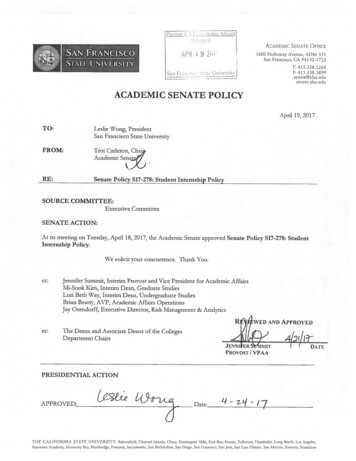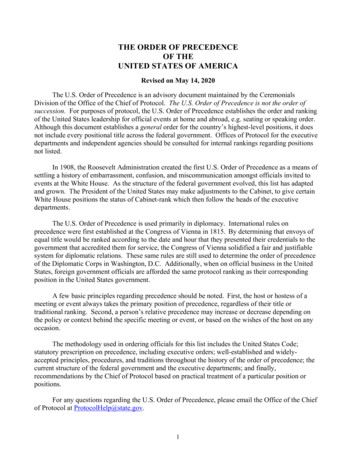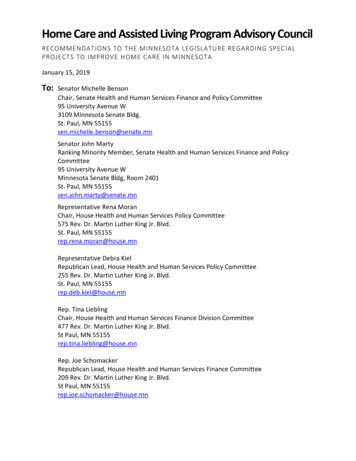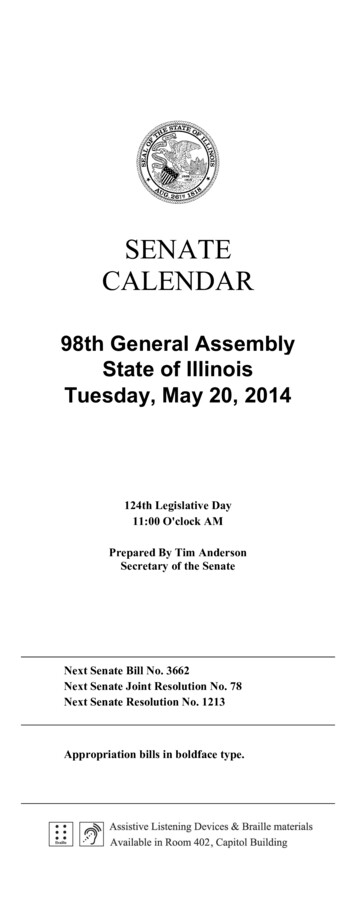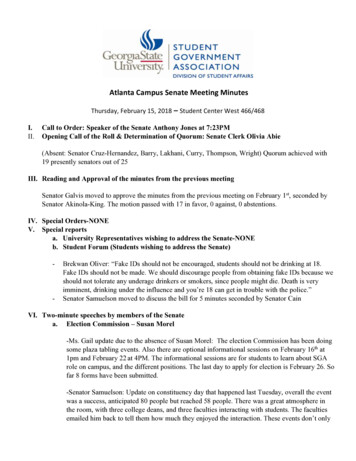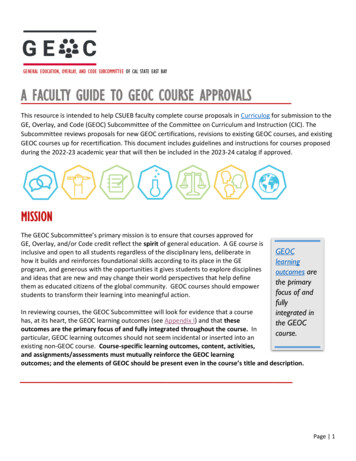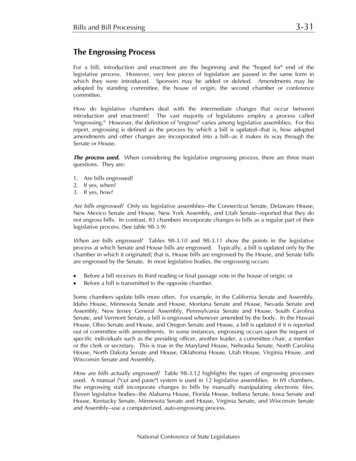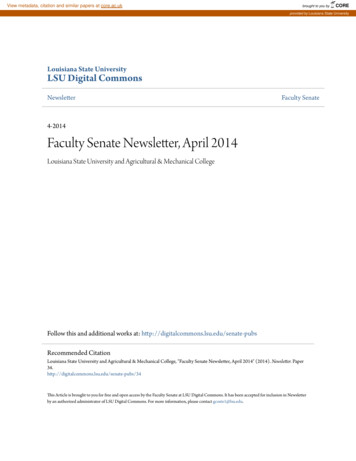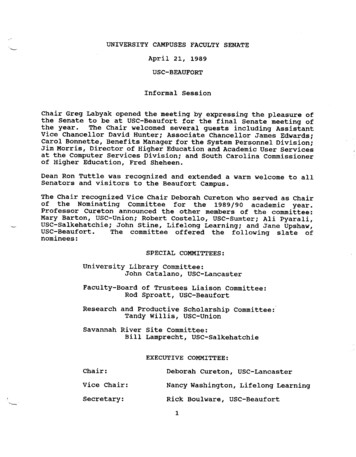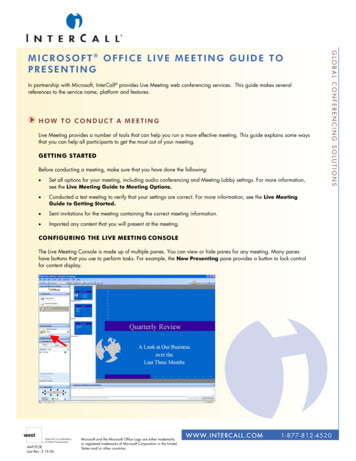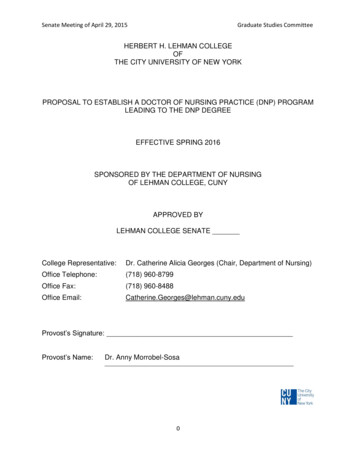
Transcription
Senate Meeting of April 29, 2015Graduate Studies CommitteeHERBERT H. LEHMAN COLLEGEOFTHE CITY UNIVERSITY OF NEW YORKPROPOSAL TO ESTABLISH A DOCTOR OF NURSING PRACTICE (DNP) PROGRAMLEADING TO THE DNP DEGREEEFFECTIVE SPRING 2016SPONSORED BY THE DEPARTMENT OF NURSINGOF LEHMAN COLLEGE, CUNYAPPROVED BYLEHMAN COLLEGE SENATECollege Representative:Dr. Catherine Alicia Georges (Chair, Department of Nursing)Office Telephone:(718) 960-8799Office Fax:(718) 960-8488Office Email:Catherine.Georges@lehman.cuny.eduProvost’s Signature:Provost’s Name:Dr. Anny Morrobel-Sosa0
Table of ContentsABSTRACT . 31.PURPOSE AND GOALS. 42.NEED AND JUSTIFICATION . 53.STUDENT INTEREST/ ENROLLMENT . 84.CURRICULUM . 105.FACULTY . 166.COST ASSESSMENT . 18REFERENCES . Error! Bookmark not defined.APPENDICES . 22Appendix A: Alignment of AACN Essentials with Program Objectives & Courses . 23Appendix B: The AACN DNP Essentials . 24Appendix C: COURSE SYLLABI . 28Appendix D: Graduates’ DNP Assessment Survey Results May 2013 . 48(b) Employer’s Survey . 49LEHMAN COLLEGE DEPARTMENT OF NURSING /EMPLOYER SURVEY. 49Appendix E . 50(a)Data on Faculty Members Directly Associated With the Proposed Doctoral Program . 50(b)DNP Nursing Faculty CVs . 51Appendix F: Faculty to be Hired. 62Appendix G: Budget Tables . 63(a) New Resources Table . 63(b) Projected Revenue Table . 64(c) The Five-Year Revenue Projections for DNP Program . 65(d) The Five-Year Financial Projections for Program . 69Appendix H: LEHMAN COLLEGE NURSING FACILITY . 711
List of TablesTable 1: Projected Full-Time Enrollment for 5-Year Period . 9Table 2: Curriculum Plan. 11Table 3: New Course Descriptions . 12Table 4: DNP Evaluation Plan . 15Table 5: Faculty Credentials . 16Table 6: Faculty Teaching Assignments (including Interdisciplinary Collaborations) . 172
ABSTRACTThe purpose of this proposal is to present a Post-Master’s Doctor of Nursing Practice (DNP)program to be offered by the Department of Nursing at Lehman College. This program is forstudents holding a degree as an advanced practice registered nurse (APRN). The program willprepare APRNs in the specialty area of Family Nurse Practitioner (FNP) to translate researchfindings into evidence-based practice; and provide cost effective, clinically-focused, high qualitycare for culturally diverse populations in the state of New York and other communities. It isexpected that the Lehman College DNP program will have no impact on existing doctor ofnursing practice programs at other CUNY colleges. The Doctor of Nursing Practice at Hunterand College of Staten Island are approved as post baccalaureate Doctor of Nursing Practice(DNP) programs.This practice-focused doctoral degree in Lehman’s nursing education will meet the growingknowledgebase required for assuring quality patient outcomes as well as reduce shortages ofdoctorally prepared nursing faculty. This program is informed by the American Association ofColleges of Nursing’s (2006) essentials of doctoral education for advanced nursing practice.Graduates will complete a 39-credit terminal degree in nursing practice, including a total of 500hours of internship/ capstone clinical experience. The graduates will be prepared to act ascatalysts for change and to assume primary roles for linking academic research and clinicalpractice for patient-sensitive outcomes research. It is anticipated that the DNP program willbegin in Spring 2016.3
PURPOSE AND GOALSBackgroundThis proposal describes the Lehman College (Department of Nursing) plan to offer a postMaster’s doctoral program leading to the degree of Doctor of Nursing Practice (DNP). The DNPprogram will prepare advanced practice registered nurses (APRNs) in the specialty area offamily nurse practitioner (FNP) to translate research findings into evidence-based practice andthus provide cost effective, clinically-focused, high quality care for culturally diverse populationsin local communities, the state of New York, and across the country. This post-Master’s DNP isa terminal professional degree representing the highest level of clinical nursing competence.The mission of the City University of New York (CUNY), outlined in its 2012 -2016 Master Plan, 1is to maintain and expand its commitment to academic excellence through an integrated systemof higher education facilitating articulation between units while expanding access and remainingresponsive to the needs of its urban setting (CUNY, 2013). Its long and successful track recordof educating nurses at the various campuses encompasses the associate, baccalaureate,master’s, and doctoral degrees.2 The impetus toward the doctoral degree in nursing practicereflects a national trend resulting from the America Association of Colleges of Nursing’s (AACN)call for doctoral preparation as the entry level for advanced practice nursing by 2015, replacingall current master’s degree nurse practitioner programs (other disciplines have establisheddoctorate as standard while nurse clinicians increasingly lack parity in credentialing). It alsoresponds to the Affordable Care Act of 2010,3 which projected the need for nurse practitionersto fill the gap in quality primary care services created by the health care reform. The growingknowledge base required for assuring quality patient outcomes in this nation’s complexhealthcare environment requires the practice-focused doctoral degree as an option in nursingeducation.While both the doctor of nursing science and doctor of philosophy in nursing (DNS/PhD) and theDNP prepare nurses to assume leadership roles in the increasingly complex health careenvironments, they make their contributions in very different ways. The DNS/PhD preparesnurse scholars to advance education, research and scholarship in academic and health caresettings. The DNP builds on the current master’s curricula in order to prepare nurses for anadvanced practice role as clinical scholars skilled in the translation of research and otherevidence into clinical practice, in the measurement of patient outcomes, and in thetransformation of health care systems to ensure quality and safety (AACN, 2006)4.The curriculum of the proposed terminal practice DNP degree will include education in thegeneration of clinically relevant data and utilization of data from clinical information systems; inthe diagnosis and treatment of health care issues of individuals, families and communities; andin the achievement of quality improvement. It will also focus on the societal and organizational1CUNY 2012-2016 Master Plan: dfThe CUNY Annual Data Report: Nursing Degree Programs, March 013FINAL.pdf3American Association of Nurse Practitioners (AANP), Affordable Care Act, legislation/affordable-care-act-aca4AACN (2006) http://www.aacn.nche.edu/DNP/pdf/Essentials.pdf24
context of the delivery of nursing services across various settings and on an understanding ofcultural differences of various groups of people. The DNP graduates will be prepared as leadersin policy advocacy as part of the Institute of Medicine’s (IOM) call for setting national agendas todecrease the use of acute care through community based services, thus increasing theAccountable Care Organizations (ACO). The curriculum of the proposed DNP program isguided by the following AACN essentials of doctoral education for advanced nursing practice(AACN, 2006, pp. 8-17) (see Appendix A for alignment of AACN Essentials with programObjectives & DNP courses):I.II.III.IV.Scientific Underpinnings for PracticeOrganizational and Systems Leadership for Quality Improvement and Systems ThinkingClinical Scholarship and Analytical Methods for Evidence-Based PracticeInformation Systems/Technology and Patient Care Technology for the Improvement andTransformation of Health CareV. Health Care Policy for Advocacy in Health CareVI. Inter-professional Collaboration for Improving Patient and Population Health OutcomesVII. Clinical Prevention and Population Health for Improving the Nation’s HealthVIII. Advanced Nursing PracticeThese essentials are foundational to any DNP specialty. The proposed DNP degree will preparegraduates for the highest level of nursing practice. The DNP is intended for nurses seeking aterminal degree in nursing practice. The program will provide course and clinical work, includingan application-oriented capstone project bringing new scientific knowledge to the practicesetting and systems of care.1. NEED AND JUSTIFICATIONSome of the many factors building momentum for change in nursing education include the rapidexpansion of knowledge underlying practice; increased complexity of patient care; nationalconcerns about the quality of care and patient safety; shortages of nursing personnel; shortagesof doctorally prepared nursing faculty; and increasing educational expectations for thepreparation of other members of the healthcare team (AACN, 2013), as well as the increasinggap in quality primary care services created in part by the enactment of the Affordable Care Actof 2010 (Anderson, 2014).5The Institute of Medicine (IOM), Joint Commission, Robert Wood Johnson Foundation (RWJF),and other authorities have called for re-conceptualizing educational programs that preparetoday’s health professionals (AACN, 2013). In view of this, the IOM has called for the doublingof the number of nurses with doctorates by 2020 in its 2011 Future of Nursing Report (Future ofNursing-NYS, 2012). The IOM further recommended that at least 10 percent of allbaccalaureate nursing graduates should matriculate into a master’s or doctoral program within 5years of graduation (Future of Nursing-NYS, 2012).Meeting the Nation’s Health Care NeedsThe DNP program focuses on preparing leaders who can “improve the quality of care, patientoutcomes and health of society by advancing health policy" (NONPF, 2013). At this pivotal5http://report.heritage.org/bg28875
period in health care, where clinical expertise is critical for transforming health care systems,strong leadership from advanced practice nurses will contribute to the delivery of high-qualitycare while working collaboratively with leaders from other health professions (IOM, 2011).“Transforming Leadership” is cited by IOM (2011) as a fundamental transformation of thenursing profession for the future of nursing. The IOM Committee, supported by RWJF,developed an Initiative on the Future of Nursing with recommendations for an action-orientedblueprint. This report suggested that “the nursing profession must produce leaders throughoutthe health care system, from the bedside to the boardroom, who can serve as full partners withother health professionals” in order to support the shifting of the nation’s health system toward agreater emphasis on primary and preventive care, resulting from the enactment of theAffordable Care Act (2010) and the Health Education and Reconciliation Act (2010)6—which aredesigned to expand health coverage to 30 million Americans; increase benefits and lower costsfor consumers; provide new funding for public health and prevention; bolster our health care andpublic health workforce and infrastructure; foster innovation and quality in our system; andmore.In order to support full transformation in health care, the need to develop a cadre of doctorallyprepared advanced practice nurses who can provide the leadership and quality care required bythe nation must be addressed. Lehman anticipates that its planned DNP program will meet astrong local, regional, and national demand for doctorally prepared clinicians who cancompetently provide the health services and leadership required. This is particularly true for theBronx, the location of Lehman College, whose population is the most economicallydisadvantaged in New York City with some of the highest rates of the leading chronic diseasesin the U.S.Meeting the Nation’s Economic NeedsEvidence has shown that nurse practitioners have been providing high-quality and cost-effectivecare (Stanik-Hutt, Newhouse, White, Johantgen, Bass, Zangaro, Wilson, Fountain, Steinwachs,Heindel, & Weiner, 2013). There is a growing need for doctorally prepared, advanced clinicalnurses to assure quality patient outcomes. In addition to providing many of the same servicesless expensively than physicians, nurse practitioners offer a focus on patient-centered care andpreventive medicine (NNCC, 2013). In 2009, it was determined that nurse practitioners providecare of equivalent quality to that of physicians at a lower cost, while achieving high levels ofpatient satisfaction and providing more disease prevention counseling, health education, andhealth promotion activities than physicians (NNCC, 2013). The national average cost of a NPvisit in 2009 was 20% less than a visit to a physician (NNCC, 2013). Clinics run by nursepractitioners create cost savings associated with reduced use of emergency rooms, urgent carecenters, hospitals, and emergency medical services. In general, the DNP graduates will help insupporting and transforming health care systems.Meeting the Community’s Health Care NeedsThe anticipated need for high quality care provided by DNPs nationwide has been echoed bylocal health care organizations. Accordingly, the Lehman DNP graduates are expected to be indemand. With the increasing morbidity and mortality rates and health disparities in the Bronx, itis apparent that there is a need in the Bronx for advanced practice nurses prepared at lthbill61.pdf6
doctoral level to deliver primary care to individuals and families in light of the new healthlegislations which will open access to primary health care services.Lehman's students come primarily from the tri-state area, with the highest concentration fromthe Bronx. They are a heterogeneous, multicultural, dynamic group of students. Because mosthave family and community ties, they have roots in the area and have a sustained history ofremaining in the community and working locally after graduation. This is precisely the kind ofLehman student who will become ideal clinical nursing experts to deliver primary health care toa diverse family population with varied life styles and a broad range of historical, social,economic, and ethnic differences.The graduates of the Lehman College Doctor of Nursing Practice Program will be prepared asDoctor of Nursing Practice- Family Health. The majority of the students will have priorpreparation as nurse practitioners. Others will be clinical specialists, nurse midwives or nurseanesthetist. These are titles that will more than likely be retained by their place of employment.In the 2011 survey of nurse practitioners done by American Academy of Nurse Practitionersnurse practitioners in NYC earned an average of 117, 775 with a base salary of 94,337. Thesalary is dependent on years of experience. The nurse practitioner with a Doctor of NursingPractice Degree (DNP) earned on average an additional 8, 576 per year(graduatenursingedu.org, AACN, 2014). Each week the Department of Nursing Chairperson andGraduate Director receives information from recruiting agencies advertising availability ofpositions in NYC and other parts of the country.Meeting the University’s NeedsThere are several DNP degree programs in NYC and surrounding areas. The majority are atprivate institutions. The private institutions are Columbia University, New York University, PaceUniversity and Molloy College. There are also programs in NJ such as Farleigh Dickinson andRutgers University. There are no DNP programs, public or private in the Bronx. It is expectedthat the Lehman program will have minimal impact on other existing CUNY DNP programs.Currently, there are DNP programs at Hunter College and the College of Staten Island. Theproposed Lehman DNP program is expected to complement the DNS/PHD program offeredthrough the CUNY Graduate Center—a consortium of three CUNY colleges including theCollege of Staten Island, Lehman and Hunter Colleges—from which CUNY doctoral degreesare awarded. The Lehman DNP program is designed for post-master’s study in response toIOM’s call to double the number of nurses with a doctorate by 2020 (recommendation # 5) inorder to add to the cadre of nurse faculty and researchers, with attention to increasing diversity(IOM, 2011). Within the third year of this proposed program, Lehman plans to respond to thecall from IOM to offer entry following the baccalaureate degree (BS). This is expected to attractacademically strong and motivated nurses by offering the opportunity to advance toward thedoctorate, which is the current trend. At present, Lehman plans to offer a DPN program with aspecialty in family nurse practitioner. The survey to our 5 major clinical partners (BronxLebanon, Jacobi, Montefiore, Lincoln and St Barnabas hospitals in the Bronx with 100%response indicated support for the Family Nurse Practitioner DNP. ((See Appendix D forEmployer Survey). The Department of Nursing will continue to reach out to clinical affiliates todetermine their future needs for other specialty areas.Meeting Nursing Student NeedsThe DNP degree is transforming not only how nurses are educated to take on advancedpractice clinical roles, but also to prepare nurses as administrators, educators, and leaders. To7
meet role expectations, nurses must be prepared at higher levels of education (IOM, 2011).According to the AACN (2013), 217 DNP programs are currently enrolling students at schools ofnursing nationwide, and an additional 97 DNP programs are in the planning stages.2. STUDENT INTEREST/ ENROLLMENTIn spring 2013, using the graduate student exit survey to assess the interest and need for aDNP program, the Lehman College Department of Nursing conducted a survey of the 3 classesof 2011, 2012 and spring 2013 MS in nursing graduates via email. Of the 82 graduates targeted,33% (27) responded, indicating unanimously that they were interested in attending a DNPprogram at Lehman. Prior to this, a similar survey was emailed to 88 spring 2012 graduates,mostly from the FNP program and the Adult Health specialties. A total of 31% (27 of 88)responded, of which 78% (21 of 27) indicated a high interest in enrolling in the DNP program atLehman.To gather further information about the pool of potential applicants, a link to an updatedgraduate nursing student online SNAP survey was emailed to forty-three spring 2013 andfall 2012 FNP graduates requesting additional information about their advanced practiceexperience as well as their enrollment preference. There was a 44% (19) response rate; ofwhich 8 (42%) indicated an interest in attending a DNP program at Lehman, while 6 (32%) wereuncertain. Detailed results of this online survey are provided in Appendix D.Based on the overall student interest, there is certainly a need for a DNP program at Lehman.The terminal practice DNP program will provide formal education and access to nurses with anearned Master of Science degree in an advanced practice specialty (i.e. direct carespecialization). MS prepared nurses in any of the following specialty areas will be eligible toapply to the Lehman College DNP program: Nurse practitionerClinical nurse specialistNurse anesthetist, andNurse midwife (CNM)The DNP curriculum extends the advanced nursing practice to include organizational andsystems leadership, ongoing improvement of health outcomes, and patient safety (AACN,2006). The culminating capstone project, which utilizes clinical experience to provide anapplication-oriented project bringing new scientific knowledge to the practice setting andsystems of care, is usually conducted at students’ place of work with the approval of theiremployers to do their practicum or at a health care facility of their choice. It is anticipated thatstudents will be employed in clinical practices. The program is designed to foster a high degreeof professional identification and support using peer colleagues.This curriculum, however, is initially being offered on a full-time basis (minimum of 12 credits).Students pursuing this MSN to DNP pathway begin classes in the spring and fall semesters.Table 1 below illustrates the College’s plan to enroll a total of 20 full-time students in the firstyear of the DNP program—10 in the spring and fall semesters, and the same for each of thefour consecutive years.8
Table 1: Projected Full-Time Enrollment for 5-Year PeriodYEAR 1YEAR 2YEAR 3YEAR 4YEAR 520160201717*201817*201917*202017*Newly Enrolled Students**2020202020Start of Year2037373737Attrition( 8%)0(-3)*(-3)*(-3)*(-3)*Total Project Graduates0171717172020202020Continuing StudentsEnd of Year** Each year 10 students will enroll in the spring and fall semesters for a total enrollment of 20students.*The attrition rate is calculated at 8% because of the small enrollment sizeThe post-master’s students are expected to complete the 39-credit DNP in two years and must completethe program within 5 years.Admission Criteria for Applicants with an MSNThe ideal candidate for Lehman's post-master’s Doctor of Nursing Practice program is one whois already making an impact on the nursing practice and has strong leadership qualities. Earned master's degree in nursing in an advanced nursing practice specialty from anationally accredited CCNE or NLNAC programCertification as an advanced practice nurse (if applicable)GPA 3.2 or above on a 4.0 scaleSatisfactory score on GRE. Data will be collected to determine.Current resume or Curriculum Vitae indicating employment experience in advancednursing practice for at least one year.Current licensure as a registered nurseTranscripts from all post-secondary institutionsThree letters of reference pertaining to academic ability, professional competency andpersonal character.Personal statementIn-person interviewE-Portfolio (includes education, professional and community activity history)PROGRESSION AND GRADUATION CRITERIAIn order to advance in the program students must: maintain a minimum cumulative 3.2 GPA and earn a minimum grade of 3.2 in all core courses earn a satisfactory grade in all clinical nursing courses. Complete clinical practicum hours within 2 semesters of course enrollment9
Academic Probation Students who have a GPA of less than 3.2 will be placed on academic probation for onesemester and must achieve a minimum GPA of 3.2 during the following semester. Students who do not meet the minimum GPA of 3.2 for two semesters will be droppedfrom the program Students who earn a failing grade will be dropped from the program Students who do not complete clinical practice hours during the semester and who areperforming satisfactorily may receive an SP-satisfactory progress grade and mustcomplete the hours by the end of the following semester or earn a grade of incompleteINC – at the discretion of the course faculty Clinical hours not completed within one year of starting will receive a grade of F Students who earn an unsatisfactory clinical grade will be dropped from the program.Graduation CriteriaIn order to graduate with the doctorate in nursing practice degree – DNP students must: complete all course work within 5 years of enrollment, including the capstone project earn a minimum cumulative GPA of 3.2 complete all clinical practicum hours – 500 hoursStudent Advisement and CounselingStudents upon entering the program will be assigned to a faculty member teaching in the DNPprogram, who will be the advisor for the student for the duration of their continued enrollment inthe program. As with our current graduate students the name of the advisor will be placed onCUNYfirst. Each student will be required to see the advisor for permission for each course, atmidterm and for permission to register for courses for the subsequent semester. Forms nowused for advisement of graduate students will also be used for the DNP students. The Typhonsoftware recently purchased for tracking clinical hours for graduate students will also be used totrack clinical /practicum hours for the DNP students.3. CURRICULUMThe proposed DNP curriculum consists of a total of 39 credits, including 500 internship andcapstone clinical hours at the post-master’s level (see Tables 2 & 3). The curriculum comprisescoursework that covers two domains: foundational outcome competencies and specialtycompetencies. The AACN DNP Essentials (AACN 2006, pp.8-17) constitute the foundation ofthe program and are threaded throughout all the courses. The DNP graduate is prepared for aparticular specialty practice through the core clinical nursing practice specialty competenciesand didactic learning experiences. At the start of this program, the Family Nurse Practitionerspecialization option is being offered to APRNs. This practice-focused doctoral program willinclude integrative practice experiences and an intense practice immersion experience thatfocuses on innovative and evidenced-based practice, reflecting the application of credibleresearch findings. This program emphasizes advanced clinical care, health systems improvement, andleadership and the translation of research into direct patient care (see Table 4 fordescriptions of new DNP courses). Advanced-practice registered nurses with a master's degree in a clinical specialty areamay enroll in this post-Master’s DNP program to obtain a DNP terminal degree. The College plans to open this track to students with a bachelor's degree innursing beginning the third year (2018) of the program launch.10
The post-baccalaureate students will complete 84 credits, depending on theiradvanced practice specialty concentration. Part-time option will be reviewed following the first year of program launch. Descriptions of the proposed eleven new courses are listed in Table 4 below. Thisproposed post-Master’s DNP curriculum is designed to admit master’s prepared certifiedAPRNs in the Family Nurse Practitioner specialty (see Appendix C for Course Syllabi).*Upon starting the DNP program, students are provided with a Portfolio Benchmark Matrix to help maintain thetargeted evidence for each courseTable 2: Post Master’s Doctor of Nursing Practice Full-time Plan of StudySpring 2016 EntrySPRING 2016Course TitleSUMMER 2016Crs Evidence BasedPractice I: Methods3 Leadership in ComplexHealth Care Systems3 Theories inTranscultural Nursing& HealthTotal Credits39SPRING 2017Course TitleCourse TitleFALL 2016CrsCourse Title Evidence BasedPractice II:Implementation &Evaluation3 Epidemiology33 Practicum I (100 clhours)9Total Credits GenomicsTotal CreditsCrs FinancialManagement andBudget Planning3 Health Policy339SUMMER 2017CrsCourse TitleCrs Practicum II &Capstone (200 clhours)6 Practicum III &Capstone (200 clhours)6Total Credits6Total Credits6Course TitleCrsTotal Credits39Fall 2016 EntryFALL 2016Course TitleSPRING 2017Crs Evidence BasedPractice I: Methods3 Leadership inComplex Health CareSystems3 Theories inTranscultural Nursing& Health3Total Credi
PROPOSAL TO ESTABLISH A DOCTOR OF NURSING PRACTICE (DNP) PROGRAM LEADING TO THE DNP DEGREE EFFECTIVE SPRING 2016 SPONSORED BY THE DEPARTMENT OF NURSING OF LEHMAN COLLEGE, CUNY APPROVED BY LEHMAN COLLEGE SENATE _ College Representative: Dr. Catherine Alicia Georges (Chair, Department of Nursing) Office Telephone: (718) 960-8799
